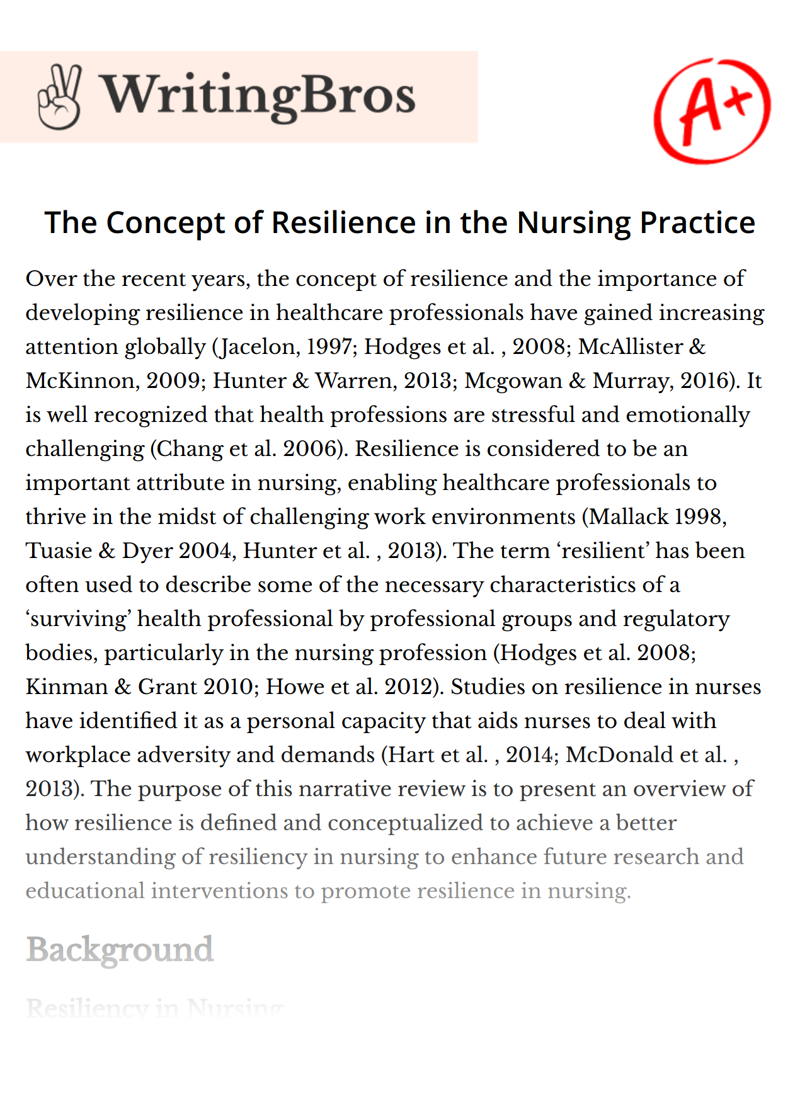The Concept of Resilience in the Nursing Practice

Over the recent years, the concept of resilience and the importance of developing resilience in healthcare professionals have gained increasing attention globally (Jacelon, 1997; Hodges et al. , 2008; McAllister & McKinnon, 2009; Hunter & Warren, 2013; Mcgowan & Murray, 2016). It is well recognized that health professions are stressful and emotionally challenging (Chang et al. 2006). Resilience is considered to be an important attribute in nursing, enabling healthcare professionals to thrive in the midst of challenging work environments (Mallack 1998, Tuasie & Dyer 2004, Hunter et al. , 2013). The term ‘resilient’ has been often used to describe some of the necessary characteristics of a ‘surviving’ health professional by professional groups and regulatory bodies, particularly in the nursing profession (Hodges et al. 2008; Kinman & Grant 2010; Howe et al. 2012). Studies on resilience in nurses have identified it as a personal capacity that aids nurses to deal with workplace adversity and demands (Hart et al. , 2014; McDonald et al. , 2013). The purpose of this narrative review is to present an overview of how resilience is defined and conceptualized to achieve a better understanding of resiliency in nursing to enhance future research and educational interventions to promote resilience in nursing.
Background
Resiliency in Nursing
Resilience has received significant academic interest over the years (Auburn, Gott & Hoare, 2015) and numerous authors have sought to give meaning to the concept of resilience (Rutter 1985; Mcgowan & Murray, 2016). Resilience is used to describe the ability of a person to recover easily and quickly from setbacks that occur during his or her life (Zautra et al. , 2010). It is often described as a dynamic concept (Rutter, 2013) and has been referred to as a personality trait by some authors (Beardslee & Podorefsky, 1988; Garmezy, 1993; Rabkin et al. , 1993; Campbell-Sills et al. , 2006) while others view resilience as a process (Flach, 1980 ; Rutter, 1987). Most definitions of resilience include the overcoming of stress or adversity or a relative resistance to environmental risk and people who are described as resilient are said to be able to persist in overcoming challenging obstacles (Bowes & Jaffee, 2013). Resilience involves external activities such as developing problem- solving skills or engaging in work, prayer, physical exercise, play, or art. Internally, resilience includes adopting ways of thinking that lessen the impact of traumatic experiences (Rushton, Batcheller, Schroeder, & Donohue, 2015).
In nursing, resilience has been explored primarily in relation to individuals, and conceptualized variously as an ability or attribute, a set of characteristics, or innate life force (Grafton et al. , 2010; Hart et al. , 2014; Jackson et al. , 2007), or a contextual and dynamic process between individuals and their environment involving internal and external protective factors (Aburn et al. , 2016; Gillespie et al. , 2007). Internal resilience-promoting factors are characterized by personal attributes including optimism, sense of purpose, faith/belief, empathy, insight, selfcare, hope (Buikstra et al. , 2010; Edward, 2005). External factors relate to protective mechanisms that are external to the individual and include social networks and support system, workplace supports and resources (Cusack et al. , 2016; Garcia-Dia et al. , 2013; McPhee, 2011). These factors have been attributed to strengthening resilience in nurses, and have formed the basis of resilience-building strategies for nurses to help them overcome and adapt to the challenges of nursing work, (Jackson et al. , 2007; McAllister and Lowe, 2011) and mitigate moral distress and burnout (Connor, 2006).
Nursing have long been acknowledged as emotionally demanding work with reports of high levels of work-related stress, anxiety, dissatisfaction and burn-out (McVicar, 2003; Chan, 2009; McAllister & McKinnon, 2009). Nursing administrators/managers are faced with the challenges to recruit and retain nurses within their healthcare organizations (Hart et al. , 2014). In today’s world, the shortage of nurses is a global issue. The shortage is based on two factors: a decreased supply and an increased demand for nurses (Outlon 2006). The nursing shortage has a tremendous effect on productivity, costs and quality of patient care (Agency for Healthcare Research and Quality, 2004; Aiken, Clarke, & Sloane, 2002; Duffield et al. , 2007). As per 2019 National health care retention and RN staffing report, the hospital turnover rate currently stands at 19. 1% and the turnover rate for bedside RNs grew to 17. 2%. The cost of turnover has a profound impact on the diminishing hospital margin. According to the survey, the average cost of turnover for a bedside RN is $52, 100 and ranges from $40, 300 to $64, 000 resulting in the average hospital losing $4. 4M – $6. 9M. Each percent change in RN turnover will cost/save the average hospital an additional $328, 400. The RN Recruitment Difficulty Index increased to 86 days on average, regardless of specialty (National health care retention and RN staffing report, 2019). Preventing healthcare staff burnout and promoting resiliency is important for the quality of patient care, as it has a negative impact on patient satisfaction, outcomes, and death rates (Henry, 2014). Currently building resilience in nurses is recognized as an important factor to help them remain in their profession (Gray, 2012). Higher levels of resilience were also associated with increased hope and reduced stress and protected nurses from emotional exhaustion and contributed to personal accomplishment (Rushton et al., 2015).
Cite this Essay
To export a reference to this article please select a referencing style below

